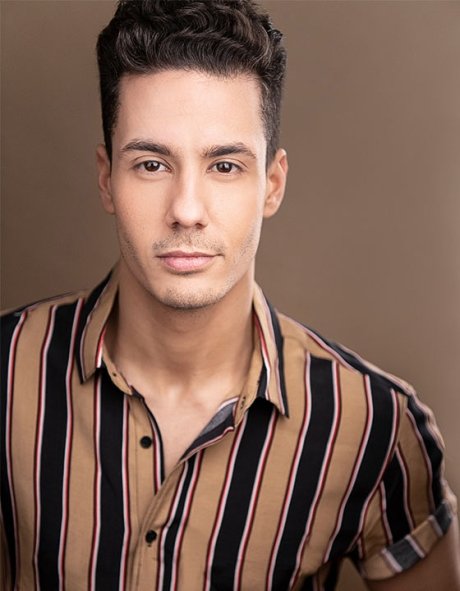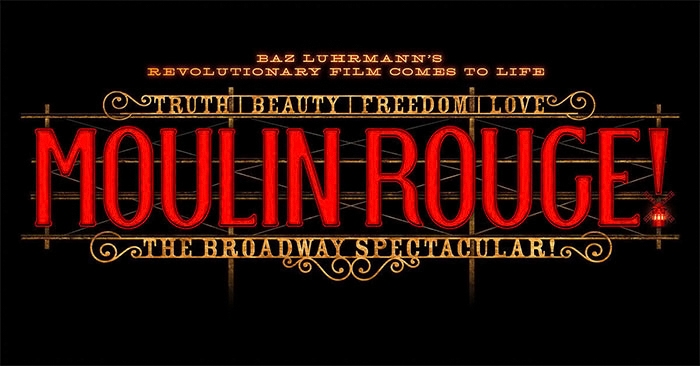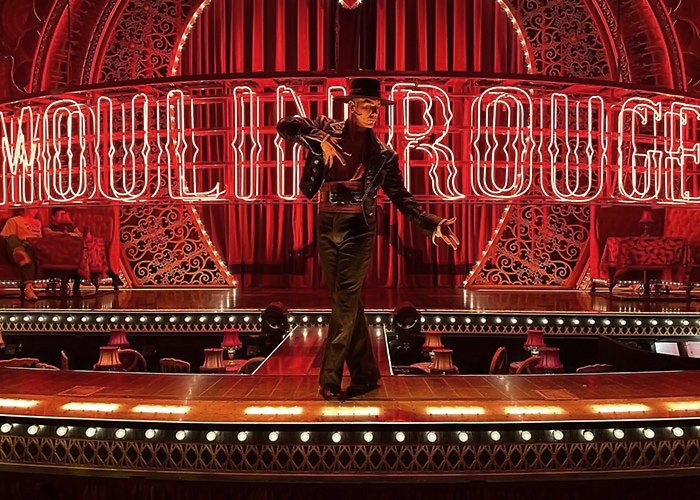The Q&A: Alum Alex Gil Cruz is on Broadway in “Moulin Rouge!”
- News & Events
- News
- The Q&A: Alum Alex Gil Cruz is on Broadway in “Moulin Rouge!”

In this interview, Gil Cruz reflects on his journey from RIC to Broadway.

Alexander Gil Cruz ’12 is an ensemble member and understudy for a principal role in the Tony Award®-winning Broadway musical “Moulin Rouge!” Already he has played the principal Santiago for two, full, two-week runs, which, he says, doesn’t happen a lot in theatre.
“As an understudy, it’s rare to play a principal for two weeks,” he says. “Usually, you hear maybe two hours before the show that they need you to go on for someone, and that’s usually for just one show. But to be able to play a role for two weeks straight is a luxury.”

Gil Cruz joined the Broadway production of “Moulin Rouge! The Musical” at the end of 2022. He came direct from the show’s first national tour, which he joined at the start of 2022. On tour, he had been playing the same roles – ensemble member and understudy for Santiago. You can catch glimpses of him in dance rehearsal while on tour in this YouTube video. (Gil Cruz is the dancer wearing a black-and-grey striped shirt tied to his waist):
If you’ve never seen the film nor its Broadway adaptation, “Moulin Rouge!” is a sumptuous, high-energy production that follows the star-crossed romance between a writer named Christian and a courtesan named Satine at a Parisian nightclub. The Broadway production has won 10 Tony Awards, including Best Musical.
In the following interview, 34-year-old Gil Cruz reflects on “Moulin Rouge!” and his journey from RIC to Broadway.
Throughout your 13-year career in musical theatre, you’ve understudied for a lot of roles. How stressful is it to be an understudy?
It can be stressful, depending on how long it’s been since you’ve played the role. It also depends on when you’re notified that you have to go on. I once got a mid-show call. That’s stressful. But to have the opportunity, like the one I’m having, to play a principal role and to be a part of the main company is what an understudy hopes for.
Is it difficult sitting on the sidelines waiting for that chance?
Being an understudy and waiting for the moment to get out there isn’t hard. You’re not sitting there longing to play the part. In “Moulin Rouge!” I have my own role as a member of the ensemble, so there’s another place to put my energy. I also know that I’m eventually going to play Santiago. “Moulin Rouge!” is good about giving everyone who understudies a chance to play the principal. There are two understudies for the role of Santiago and we both get equal time to play him.
How nervous were you the first time you played Santiago?
The first night was during the national tour and it was nerve-racking. Anytime something is new it’s going to be nerve-racking. But by the time I got to Broadway, I wasn’t nervous-worried, thinking, “Uh-oh, I hope I remember everything.” I was excited-nervous. I had made enough mistakes on the road that by the time I got to Broadway it was more a state of play, which is the ideal state to be in. I’ve settled into the role. I know it really, really well. I know what’s going to happen when I get out there. And if something is different, I enjoy the difference and ride that. That’s true in life, as well.
What’s your work schedule like?
We do eight shows in six days, Tuesday through Sunday. I have Mondays off.
When did the acting bug bite you?
I didn’t get into theatre until I was 15 – a sophomore in high school. It wasn’t the art form that bit me at first. It was making friends and being a part of a community. In high school, I also got into community theatre and competitive theatre. By the time I was 19 or 20, I was auditioning and getting paid to do musical theatre for the New Bedford Festival Theatre. But I didn’t start taking dance classes until I was 19 at Rhode Island College. That’s late compared to other performers who’ve been dancing since they were a kid. Dancing ended up being a natural talent for me. I picked it up really quick and I started getting more work because of it.
But you didn’t major in music, theatre or dance at RIC.
When I enrolled at RIC, I knew I wanted to perform but I didn’t know how to go about it. My parents are immigrants from the Azores. They’ve never seen a musical besides the ones I’ve been in. No one knew what to do. I auditioned for the spring musical in my freshman year but didn’t get in. So, I decided to major in speech and hearing pathology and then switched to a communication major in my senior year.
However, I did take theatre and movement classes in my first semester at RIC, and with dance as my minor, I took dance classes, as well. I loved my movement classes with Professor Bill Wilson. I thought he was a really cool, smart guy. I still think of those classes often. I also learned many forms of dance – ballet, modern and jazz. I learned a lot by watching other great student dancers. It was the first time I had seen dancers be really, truly excellent, and it was at the college level.
What did you do after graduation?
I said, “I’m going to go to New York and audition.” I landed a part in the national tour of “A Chorus Line.” I immediately moved to New York and began rehearsals. I was 23.
You were pretty fortunate.
I think I’m just a really, really hard worker. Being such a late-starter, I just wanted to be as good as everyone else, so I worked extremely hard.
What’s the biggest challenge you’ve faced in your career?
All the biggest ones have been inside my own brain. Not believing in myself has been the main struggle. Beating myself up all the time for not “doing enough” or being “good enough” and thinking I won’t ever be good enough to do what I’m doing right now. After a point, you can’t really believe that weird lie you’re telling yourself when the outside world says differently. My only regret is that I would have put myself out there sooner had I believed in myself more. Now I push myself to be in the right rooms all the time with the people who are doing the things I want to do.
How did you come to this self-acceptance?
Time. I think we’re always too close to the canvas to get a good, objective look at ourselves. Sometimes that comes with time.
What advice would you give to those coming up after you?
If there was a top 10 list, I would put resilience on the list three times. Lack of resilience is the reason why most people bow out of this business. They can’t take the constant “no.” Sustaining a long-term career in musical theatre has less to do with your talent and more to do with showing up a lot, including showing up for yourself.
I’ve worked in musical theatre for 13 years without having a side job. I’ve performed all over the country in every state except Hawaii as well as outside the country in China and Canada. For 13 years I’ve paid my bills doing art, and it’s been a slow, patient climb, where I truly learned to be patient, to hone my craft, to celebrate other people’s wins, because a lot of people got on Broadway before I did, people who are younger than me, people who I might consider my student. But I’ve got a lot of drive and I’m my own motivator.
Finish the sentence “Theatre is . . .
Theatre is one of the oldest traditions of all time, going back to ancient Greece. The world would be a much less colorful and interesting place without it. We’re pumping out joy and emotions to a world that needs it.
Along with “Moulin Rouge! The Musical,” Alex Gil Cruz has appeared in the national tours of “A Chorus Line” and “West Side Story.” His television and film appearances include “The Marvelous Mrs. Maisel,” “Law & Order: Organized Crime,” “SNL” and “The Get Down.” Gil Cruz hopes to audition for more TV and film and perhaps write, direct and produce his own film.
This interview has been edited and condensed.
Learn more about RIC’s Department of Music, Theatre and Dance.
